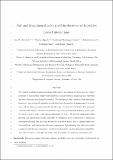Fast and frugal heuristics for portfolio decisions with positive project interactions
Abstract
We consider portfolio decision problems with positive interactions between projects. Exact solutions to this problem require that all interactions are assessed, requiring time, expertise and effort that may not always be available. We develop and test a number of fast and frugal heuristics – psychologically plausible models that limit the number of assessments to be made and combine these in computationally simple ways – for portfolio decisions. The proposed “add-the-best” family of heuristics constructs a portfolio by iteratively adding a project that is best in a greedy sense, with various definitions of “best”. We present analytical results showing that information savings achievable by heuristics can be considerable; a simulation experiment showing that portfolios selected by heuristics can be close to optimal under certain conditions; and a behavioral laboratory experiment demonstrating that choices are often consistent with the use of heuristics. Add-the-best heuristics combine descriptive plausibility with effort-accuracy trade-offs that make them potentially attractive for prescriptive use.
Citation
Durbach , I N , Algorta , S , Kantu , D K , Katsikopoulos , K V & Şimşek , Ö 2020 , ' Fast and frugal heuristics for portfolio decisions with positive project interactions ' , Decision Support Systems , vol. 138 , 113399 . https://doi.org/10.1016/j.dss.2020.113399
Publication
Decision Support Systems
Status
Peer reviewed
ISSN
0167-9236Type
Journal article
Description
Funding: ID is supported in part by funding from the National Research Foundation of South Africa (Grant ID 90782, 105782).Collections
Items in the St Andrews Research Repository are protected by copyright, with all rights reserved, unless otherwise indicated.

